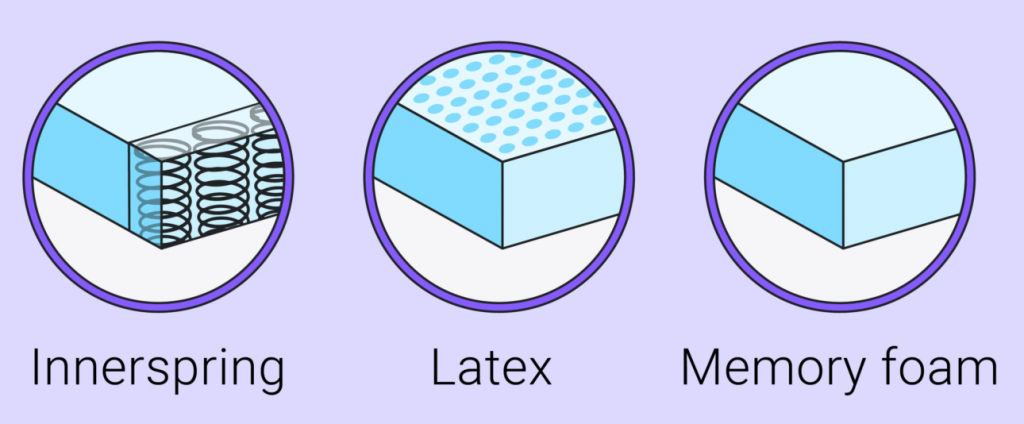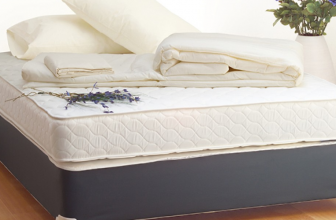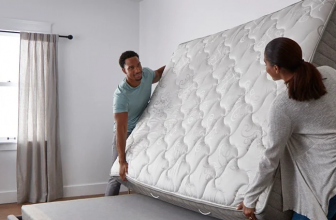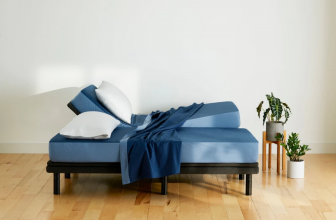Brief: How Often Should You Get a New Mattress
- Introduction: Understanding when to replace your mattress is crucial for comfort, support, and health. A mattress’ lifespan is influenced by various factors, necessitating periodic evaluation.
- Factors Influencing Mattress Lifespan:
- Material: Innerspring (7-8 years), Latex (5-7 years), Memory Foam (6-8 years).
- Care and Cleaning: Regular cleaning and proper maintenance extend lifespan.
- Weight of Sleepers: Heavier sleepers may shorten mattress life.
- Pets: Damage and wear from pets can reduce lifespan.
- Benefits of a New Mattress:
- Health: Improved support for the spine and hips.
- Comfort: Reduced motion transfer for undisturbed sleep.
- Allergy Reduction: New mattresses minimize allergen accumulation.
- When to Replace:
- Mattresses should ideally be replaced every 8-10 years.
- Signs for replacement include sagging, lumps, discomfort, and allergic reactions.
- Maximizing Mattress Lifespan:
- Regular rotation and flipping, use of mattress protectors, and avoiding jumping on the bed.
- Choosing a New Mattress:
- Consider personal sleep preferences, mattress type, size, firmness, and budget.
- Conclusion: Regular assessment of mattress condition and understanding individual sleep needs are key to determining the right time for replacement. Benefits of a new mattress include improved health, comfort, and allergy relief.
- FAQs:
- How to extend mattress life? Rotate and use protectors.
- When to replace a mattress? Every 8-10 years or when showing signs of wear.
- How to choose a new mattress? Based on sleep preferences, size, and firmness.
Mattresses are notoriously expensive. According to the US Department of Labor, “73% of families lack the $500 cost for a basic mattress set”. So what should you do when your mattress is beginning to show signs of wear and you’ve had it for some time? You should probably start looking around for a new one, sooner rather than later!

But before starting your research you should understand how often you should get a new mattress. Most manufacturers claim that you should do it every 6-8 years, but there’re nuances. So, before purchasing one, you need to consider some factors that influence the mattress’s lifespan.
Factors Influencing Mattress Lifespan
There are certain factors that influence a mattress’s lifespan and can affect your sleep. Contamination, wear and tear of different materials, as well as the number of occupants in your home, are factors that can drastically prolong the lifespan of your mattress.
Mattress Materials
The first and most important factor is mattress material. The material alone will determine the lifespan of your mattress. The most popular materials are innerspring, latex, and memory foam mattresses.

- Innerspring Mattresses. Spring mattresses have an average lifespan of 7-8 years and are made from different types of springs, which makes them durable enough to resist damage if you or your partner moves around during the night. However, it’s important to note that when a spring mattress is more than 10 years old, you should consider getting a new one simply because the springs may begin to wear out over time and become less supportive.
- Latex Mattresses. Latex mattresses are made from natural rubber and considered to be one of the most durable. But they have a shorter lifespan, about 5-7 years due to nonstop use. If you choose a latex mattress, you should consider getting a new one when it can’t recover its original form after lying on it or if it has stains as latex is very sensitive to bodily fluids and requires deep cleaning.
- Memory Foam Mattresses. These mattresses have an average lifespan of 6-8 years and begin to lose their support when they’re older than 10 years. However, they are very durable and are recommended for those who have back problems as it molds to your body and relieves pressure from your spine.
Cleaning And Care
As with almost anything else, the more you use it, the more you wear it out. This is a pricier factor for mattresses as they’re typically more expensive than beds and other pieces of furniture.
However, once you take proper care of your mattress and making sure to vacuum stubborn stains regularly, you can maximize its lifespan by not using it in high-traffic areas such as near the bed or between guests who are obese. Moving your mattress when necessary and keeping it away from pets is also important.
Sleeper’s Weight
The number of occupants in your house will have a direct effect on how long your mattress lasts. The heavier the person, the longer they’ll sleep and the more they will put pressure on the bed, meaning that it will wear out faster.
Pets
Pets are another factor when it comes to how often you should get a new mattress. It’s been proven that pets sleep on every inch of your bed, which means it will wear down faster and need to be replaced sooner.

Cat’s claws, for example, can easily damage the vinyl and other types of upholstery that they love sleeping on, making it more likely to rip or tear. Therefore, it is recommended to have a separate pet bed and cat scratcher so that your mattress will last longer as pets love spending time on beds.
Price
The price of something also determines its lifespan; the more expensive something is, the longer it will last you. The more money you’ve paid for a mattress, the longer it will last. However, you should never be fooled by its price tag.
Why Is A New Mattress Better Than Yours?
If you’ve had your mattress for a while, and even if you think it’s still in good condition, you should start looking for something new to replace it, but why get a new one when your current one is still performing well? Well, why not?

Health Factors
When buying a new mattress designed to support your body’s shape, health and wellness are both top priorities. Whether you’re sleeping on your side, back, or stomach, comfort is far more important than the position you’re taking.
You will also have a certain level of support for your hips and spine while you sleep, making it a lot easier to wake up in the morning without any back pain or stiffness.
Reduce Motion Transfer
A new mattress will be able to absorb any movement that you make while you’re sleeping, meaning that if your partner moves around at night, it won’t disturb you too much. A new mattress will also be designed to reduce motion transfer as much as possible so that each sleeper has the most comfortable sleep possible during the night.
Reduce Allergies
Allergies can make it difficult to sleep, and if you are allergic to something, you may find yourself waking up in the middle of the night with a breakout or asthma attack. If you’ve already slept on a mattress for too long, it will be tough to find one that doesn’t react in any way by you; but it will be far less likely to cause reactions if you replace it with a new one.
FAQ
How often should I replace my mattress?
It is recommended to replace your mattress every 8 to 10 years.
How do I know when it’s time for a new mattress?
The signs that suggest it is time for a new mattress include sagging, visible lumpiness in the mattress, difficulty getting comfortable, consistent morning stiffness and aches, as well as nightly wakefulness or fatigue.
How can I maximize the life of my mattress?
To maximize the life of your mattress, rotate and flip it regularly, use mattress protectors, do not jump on it, and place in an area that is free of moisture and humidity.
Is it necessary to get a new firm mattress every 8 to 10 years?
Yes, it is recommended to replace your firm mattress every 8 to 10 years.
How should I choose a new mattress?
Ultimately, the right mattress for you should be determined by your sleep needs and preferences. Consider factors such as comfort, support, firmness, and mattress type.
What factors should I take into consideration when shopping for a new mattress?
Consider carefully the material and construction of the mattress, the firmness level, any special features, the size of the mattress, and the cost.
How can I choose the firmness level that’s right for me?
You should test each mattress you consider to determine which firmness level is the most comfortable for you.
How can I choose the firmness level that’s right for me?
You should test each mattress you consider to determine which firmness level is the most comfortable for you.
What is the best size for my mattress?
Before you select the size of your mattress, consider the size of your bedroom, the size of the bed frame, and the number of people who will be sharing the bed.
How much should I expect to spend on a new mattress?
The cost of a new mattress will depend on the brand, quality, and size. You can expect to spend anywhere from a few hundred dollars to several thousand dollars.
Are there any financing options available for a mattress?
Many mattress companies offer financing options, such as zero-interest payment plans, that can make purchasing a new mattress more affordable.
Are there any warranties for mattresses?
Yes, many mattress brands will offer a warranty that covers manufacturing defects and workmanship for a period of time.








